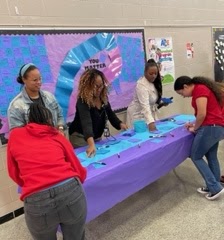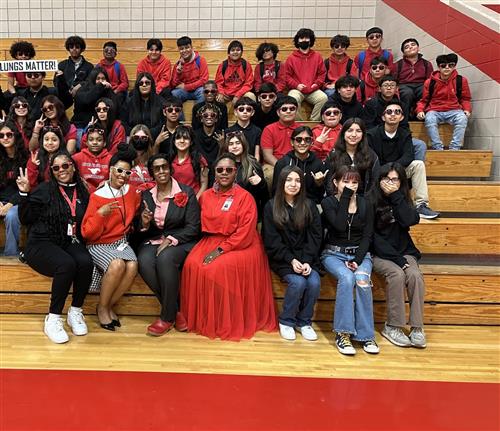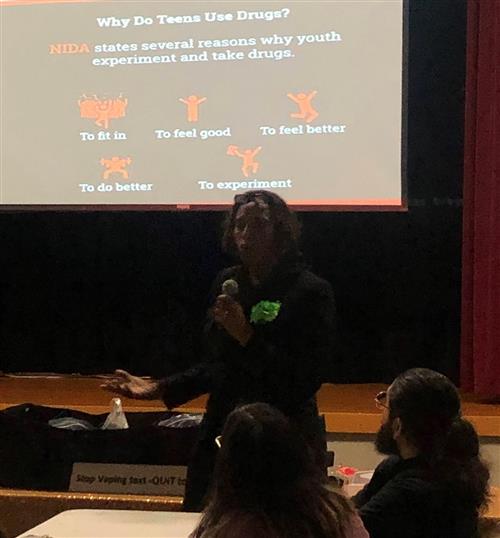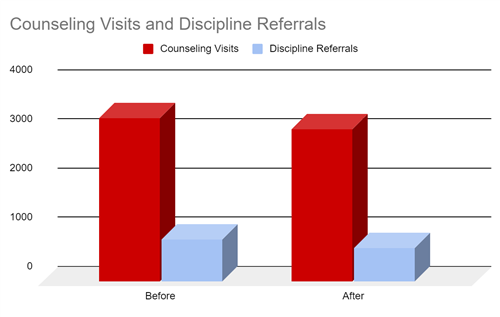-
S.M.A.R.T. Goals
Goal #1: Individual Planning
During the school year, NSMS Counselors will conduct college and career awareness activities and participate in the transition activities for students.
Objective 1: Implement one-on-one conferences with each student to discuss/provide academics, emotional/behavioral support, and attendance.
-
Strategy 1: Utilize non-core courses to meet with students.
-
Strategy 2: Utilize campus data (i.e. attendance, grades, behavior) to guide conference discussions.
Objective 2: Guide students to develop 4-year career plans and goal-setting.
-
Strategy 1: Provide classroom guidance lessons on careers and planning for the future.
-
Strategy 2: Students will use knowledge obtained from guidance lessons to complete goal-setting activity during individual conferences.
Goal #2: Guidance Curriculum
During the school year, NSMS Counselors will provide campus interventions that target bullying, suicide prevention, abuse, harassment, and relational violence behaviors.
Objective 1: Implement large/small groups with targeted topics to bring awareness and prevention of harmful behaviors.
-
Strategy 1: Implement campus assemblies in partnership with outside agencies to discuss/provide intervention strategies.
-
Strategy 2: Provide parent/student workshops throughout the school year to address bullying, suicide, abuse, harassment, and other violence-related behaviors.
Objective 2: Implement and provide daily/weekly/monthly social and emotional lessons (SEL) on campus.
-
Strategy 1: Utilize Character Strong SEL curriculum to implement guidance lessons.
-
Strategy 2: Campus counselors will provide support of SEL lessons to teachers as needed.
Goal #3: Responsive Services
During the school year, NSMS Counselors will be responsive to the immediate needs of students on campus through individual counseling, small group counseling, and referrals to community partners.
Objective 1: Implement crisis intervention protocols to address student immediate needs.
-
Strategy 1: Conduct professional development to campus staff to identify crisis-related behaviors in the classroom and the referral process to the counseling department.
-
Strategy 2: Educate students to know their counselor and how to contact the counseling department directly for immediate assistance.
Objective 2: Implement small group counseling and conflict resolution assistance with peers and campus staff.
-
Strategy 1: Partnership with campus staff to provide peer to peer conflict resolution interventions.
-
Strategy 2: Provide support at parent-teacher, student-teacher, staff-student conferences to identify conflicts and provide solutions for success.
Goal #4: System Support
Throughout the school year, NSMS Counselors will coordinate or participate in various programs and duties that will help establish, maintain or enhance the counseling program.
Objective 1: Implement the presence of a counselor at intervention and special populations committee meetings.
-
Strategy 1: NSMS counselors will attend response to intervention (RTI) committee meetings to provide support and feedback for the overall success of the students.
-
Strategy 2: NSMS counselors will attend admission, review, and dismissal (ARD) meetings as needed to advocate for students and ensure that the individualized educational plan (IEP) meets the needs of the student academically, emotionally, socially and behaviorally.
Objective 2: Implement consistent professional development of staff and parent education workshops for parents/guardians in addition to program management.
-
Strategy 1: NSMS counselors will provide professional development to staff on a monthly/quarterly basis on mental health topics such as, but not limited to, child abuse, CPS reporting, suicide, and substance abuse.
-
Strategy 2: Parent education workshops will be provided consistently throughout the year to increase parent awareness of mental health topics, increase parent engagement with the campus, and provide support to students outside of the classroom.
-
Strategy 3: NSMS counselors will solicit survey input after each workshop from students, parents, and staff to gauge the effectiveness of the program and adjust as necessary.
-
-
STUDENT OUTCOME DATA VISUALIZATION
-
Highlight of Activities
-

Guidance Curriculum 1
Students participated in Suicide Prevention Month, by creating Pledge to promote kindness, respect, and inclusivity.
-

Guidance Curriculum 2
"Escape the Vape" was a grade level assembly where students learned about the disadvantages of vaping and promoting healthy lungs. They learned the "Escape the Vape" song.
-

System Support 3
NSMS Counselors and conducted a professional development to faculty and staff on the dangers of vaping.


